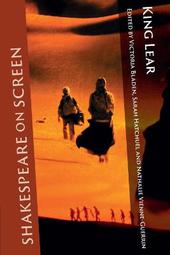
|
Shakespeare on Screen: King Lear
Paperback / softback
Main Details
| Title |
Shakespeare on Screen: King Lear
|
| Authors and Contributors |
Edited by Victoria Bladen
|
|
Edited by Sarah Hatchuel
|
|
Edited by Nathalie Vienne-Guerrin
|
| Series | Shakespeare on Screen |
|---|
| Physical Properties |
| Format:Paperback / softback | | Pages:276 | | Dimensions(mm): Height 228,Width 151 |
|
| Category/Genre | Films and cinema
Television
Shakespeare plays |
|---|
| ISBN/Barcode |
9781108446891
|
| Classifications | Dewey:822.33 |
|---|
| Audience | | Professional & Vocational | |
|---|
| Illustrations |
Worked examples or Exercises; 13 Halftones, black and white
|
|
Publishing Details |
| Publisher |
Cambridge University Press
|
| Imprint |
Cambridge University Press
|
| Publication Date |
12 August 2021 |
| Publication Country |
United Kingdom
|
Description
The third volume in the re-launched series Shakespeare on Screen is devoted to film versions and adaptations of King Lear. Bringing together an international group of scholars, the chapters provide new insights and perspectives on what constitutes 'Learness' in a range of films, TV productions, translations, free retellings and appropriations from around the world. Taking 'screen' in its broader sense, it also covers digital material such as video archives, internet movies and YouTube videos. The volume features an invaluable film-bibliography and accompanying online resources include additional essays and an expanded version of the film-bibliography.
Author Biography
Victoria Bladen is Sessional Lecturer and Honorary Research Fellow in the School of Communication and Arts at the University of Queensland where she has twice received a Faculty award for teaching excellence. She has published four Shakespearean text guides: Measure for Measure (2015), Henry IV Part 1 (2012), Julius Caesar (2011) and Romeo and Juliet (2010). She co-edited Supernatural and Secular Power in Early Modern England (2014) and Shakespeare on Screen: Macbeth (2013) as well as Shakespeare and the Supernatural (forthcoming). She has also published articles in several volumes of the Shakespeare on Screen series including Shakespeare on Screen: 'The Tempest' and Late Romances (Cambridge, 2017) and is on the editorial board for the Shakespeare on Screen in Francophonia project in France. Sarah Hatchuel is Professor of Film and Media Studies at the Universite Paul Valery, Montpellier and President of the Societe Francaise Shakespeare. She has written extensively on adaptations of Shakespeare's plays: Shakespeare and the Cleopatra/Caesar Intertext: Sequel, Conflation, Remake (2011); Shakespeare, from Stage to Screen (2004); A Companion to the Shakespearean Films of Kenneth Branagh (2000) and on television series: Lost: Fiction vitale (2013); Reves et series americaines: la fabrique d'autres mondes (2016). She is general co-editor of the Shakespeare on Screen series and of the online journal TV/Series. Nathalie Vienne-Guerrin is Professor in Shakespeare Studies at the Universite Paul Valery, Montpellier, Vice President of the Societe Francaise Shakespeare and Director of the 'Institut de Recherche sur la Renaissance, l'age Classique et les Lumieres' (IRCL, UMR 5186 CNRS). She is co-editor-in-chief of the international journal Cahiers Elisabethains and co-director, with Patricia Dorval, of the Shakespeare on Screen in Francophonia Database. She has published The Unruly Tongue in Early Modern England, Three Treatises (2012) and is the author of Shakespeare's Insults: A Pragmatic Dictionary (2016). She is co-editor, with Sarah Hatchuel, of the Shakespeare on Screen series.
Reviews'... this volume provides a perfect foundation from which to disperse and dislocate Lear's screen presence ever further.' Peter Kirwan, Cahiers Elisabethains: A Journal of English Renaissance Studies 'The empathy that pervades the latest addition to the excellent Shakespeare on Screen series is at times overwhelming ... this volume provides a perfect foundation from which to disperse and dislocate Lear's screen presence ever further.' Peter Kirwan, The Shakespeare Newsletter 'The collection contains more richly suggestive essays than I have space to mention; it will be indispensable to students of King Lear. The editors' calculated broad approach creates a collection that is more than the sum of its parts, and which is animated by a sense of conscience and compassion.' Sally Barnden, Shakespeare Bulletin
|